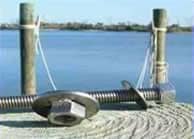
Date Posted:
January 17, 2018
Post Author:
Marsh Fasteners
Categories:
Walking into the fastener section of your local hardware and home center can be daunting! An entire aisle dedicated to nuts and bolts and screws with hundreds of drawers with a dozen compartments – each with a different screw, bolt, or nut. Having a working knowledge of how fasteners are identified, and which type of fastener is best for which particular application can reduce your confusion – and hopefully your time in the fastener aisle – so that you can get back on the water sooner.
What Types of Fasteners Are There?
When choosing a metal fastener, it is important to know what types of fasteners there are and how they are used. There are three groups of fasteners namely: bolts, screws, and rivets.
- Bolts require nuts and access to both sides of the fastener hole.
- Machine screws are identical to bolts but thread into a tapped hole. Sheet-metal and wood screws are self-tapping, cutting threads into the smooth surface of a drilled hole.
- Rivets have no threads. They come with a factory head on one end, with the other end deformed at installation to create a second “head.” The rivets that contemporary boat owners are most likely to use will be blind rivets, commonly called pop rivets, which can be installed even if you only have access to one side of the fastener hole.
When to Use a Self-Tapping Screw and When to Through-Bolt
This is a common question asked by boaters when installing deck hardware. Some applications are well suited to being secured by the aggressive threads of a self-tapping screw. These are usually non-critical items like:
- Bimini and dodger frame brackets and snaps,
- Halyard bags,
- Cabinetry,
- Interior hardware, and
- Interior decorations.
Basically, anything that carries a lighter load and is not something you plan to “hang” your life on.
Through bolting is the best approach for hardware that experiences high loads such as:
- Cleats,
- Windlasses,
- Lifeline stanchions,
- Pedestal guards,
- Rope clutches, etc.
In other words, anything that is critical to your safety or to the boat’s function should be through bolted.
That said, there will be situations where through-bolting is not possible, like the outboard fasteners on stanchion bases installed close to the edge of the deck for example. In these cases, through bolting where possible and installing the largest and longest possible fastener in the rest may suffice.
What Type of Material Should Be Used?
When boaters gather around the dock carts and discuss the merits of using an oval head sheet metal screw vs. a flat head wood screw, the conversation almost always turns to what is the best material to use. Chrome plated brass, bronze or stainless steel? The general consensus is that stainless steel is the best all-round fastener material. And for good reason:
- Stainless steel offers excellent corrosion resistance and strength,
- Stainless steel fasteners are available at a reasonable price, and
- There are several stainless steels from which to choose.
Marsh Fasteners
Marsh Fasteners has been supplying stainless steel fasteners for maritime use for over 2 decades. For the best in products, pricing and service, contact us now!



